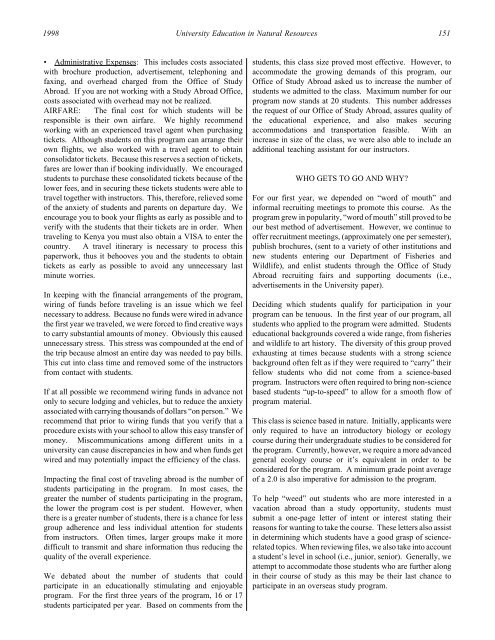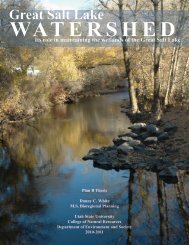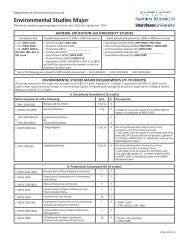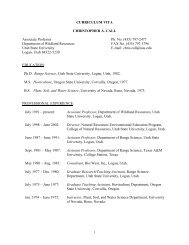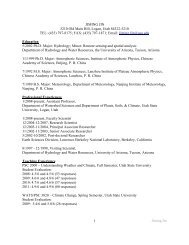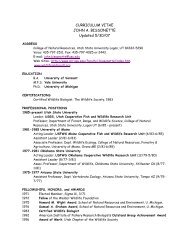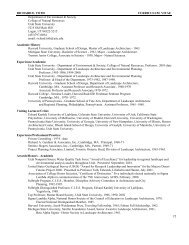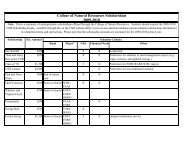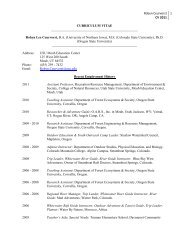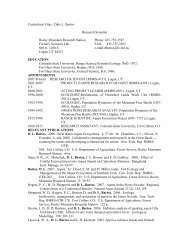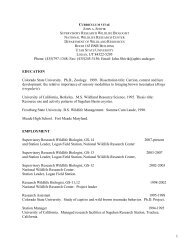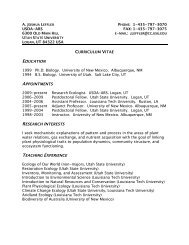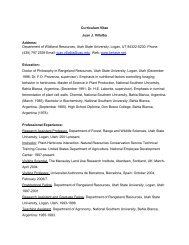University Education in Natural Resources - CNR Home - Utah State ...
University Education in Natural Resources - CNR Home - Utah State ...
University Education in Natural Resources - CNR Home - Utah State ...
Create successful ePaper yourself
Turn your PDF publications into a flip-book with our unique Google optimized e-Paper software.
1998<br />
<strong>University</strong> <strong>Education</strong> <strong>in</strong> <strong>Natural</strong> <strong>Resources</strong> 151<br />
• Adm<strong>in</strong>istrative Expenses: This <strong>in</strong>cludes costs associated<br />
with brochure production, advertisement, telephon<strong>in</strong>g and<br />
fax<strong>in</strong>g, and overhead charged from the Office of Study<br />
Abroad. If you are not work<strong>in</strong>g with a Study Abroad Office,<br />
costs associated with overhead may not be realized.<br />
AIRFARE: The f<strong>in</strong>al cost for which students will be<br />
responsible is their own airfare. We highly recommend<br />
work<strong>in</strong>g with an experienced travel agent when purchas<strong>in</strong>g<br />
tickets. Although students on this program can arrange their<br />
own flights, we also worked with a travel agent to obta<strong>in</strong><br />
consolidator tickets. Because this reserves a section of tickets,<br />
fares are lower than if book<strong>in</strong>g <strong>in</strong>dividually. We encouraged<br />
students to purchase these consolidated tickets because of the<br />
lower fees, and <strong>in</strong> secur<strong>in</strong>g these tickets students were able to<br />
travel together with <strong>in</strong>structors. This, therefore, relieved some<br />
of the anxiety of students and parents on departure day. We<br />
encourage you to book your flights as early as possible and to<br />
verify with the students that their tickets are <strong>in</strong> order. When<br />
travel<strong>in</strong>g to Kenya you must also obta<strong>in</strong> a VISA to enter the<br />
country. A travel it<strong>in</strong>erary is necessary to process this<br />
paperwork, thus it behooves you and the students to obta<strong>in</strong><br />
tickets as early as possible to avoid any unnecessary last<br />
m<strong>in</strong>ute worries.<br />
In keep<strong>in</strong>g with the f<strong>in</strong>ancial arrangements of the program,<br />
wir<strong>in</strong>g of funds before travel<strong>in</strong>g is an issue which we feel<br />
necessary to address. Because no funds were wired <strong>in</strong> advance<br />
the first year we traveled, we were forced to f<strong>in</strong>d creative ways<br />
to carry substantial amounts of money. Obviously this caused<br />
unnecessary stress. This stress was compounded at the end of<br />
the trip because almost an entire day was needed to pay bills.<br />
This cut <strong>in</strong>to class time and removed some of the <strong>in</strong>structors<br />
from contact with students.<br />
If at all possible we recommend wir<strong>in</strong>g funds <strong>in</strong> advance not<br />
only to secure lodg<strong>in</strong>g and vehicles, but to reduce the anxiety<br />
associated with carry<strong>in</strong>g thousands of dollars “on person.” We<br />
recommend that prior to wir<strong>in</strong>g funds that you verify that a<br />
procedure exists with your school to allow this easy transfer of<br />
money. Miscommunications among different units <strong>in</strong> a<br />
university can cause discrepancies <strong>in</strong> how and when funds get<br />
wired and may potentially impact the efficiency of the class.<br />
Impact<strong>in</strong>g the f<strong>in</strong>al cost of travel<strong>in</strong>g abroad is the number of<br />
students participat<strong>in</strong>g <strong>in</strong> the program. In most cases, the<br />
greater the number of students participat<strong>in</strong>g <strong>in</strong> the program,<br />
the lower the program cost is per student. However, when<br />
there is a greater number of students, there is a chance for less<br />
group adherence and less <strong>in</strong>dividual attention for students<br />
from <strong>in</strong>structors. Often times, larger groups make it more<br />
difficult to transmit and share <strong>in</strong>formation thus reduc<strong>in</strong>g the<br />
quality of the overall experience.<br />
We debated about the number of students that could<br />
participate <strong>in</strong> an educationally stimulat<strong>in</strong>g and enjoyable<br />
program. For the first three years of the program, 16 or 17<br />
students participated per year. Based on comments from the<br />
students, this class size proved most effective. However, to<br />
accommodate the grow<strong>in</strong>g demands of this program, our<br />
Office of Study Abroad asked us to <strong>in</strong>crease the number of<br />
students we admitted to the class. Maximum number for our<br />
program now stands at 20 students. This number addresses<br />
the request of our Office of Study Abroad, assures quality of<br />
the educational experience, and also makes secur<strong>in</strong>g<br />
accommodations and transportation feasible. With an<br />
<strong>in</strong>crease <strong>in</strong> size of the class, we were also able to <strong>in</strong>clude an<br />
additional teach<strong>in</strong>g assistant for our <strong>in</strong>structors.<br />
WHO GETS TO GO AND WHY?<br />
For our first year, we depended on “word of mouth” and<br />
<strong>in</strong>formal recruit<strong>in</strong>g meet<strong>in</strong>gs to promote this course. As the<br />
program grew <strong>in</strong> popularity, “word of mouth” still proved to be<br />
our best method of advertisement. However, we cont<strong>in</strong>ue to<br />
offer recruitment meet<strong>in</strong>gs, (approximately one per semester),<br />
publish brochures, (sent to a variety of other <strong>in</strong>stitutions and<br />
new students enter<strong>in</strong>g our Department of Fisheries and<br />
Wildlife), and enlist students through the Office of Study<br />
Abroad recruit<strong>in</strong>g fairs and support<strong>in</strong>g documents (i.e.,<br />
advertisements <strong>in</strong> the <strong>University</strong> paper).<br />
Decid<strong>in</strong>g which students qualify for participation <strong>in</strong> your<br />
program can be tenuous. In the first year of our program, all<br />
students who applied to the program were admitted. Students<br />
educational backgrounds covered a wide range, from fisheries<br />
and wildlife to art history. The diversity of this group proved<br />
exhaust<strong>in</strong>g at times because students with a strong science<br />
background often felt as if they were required to “carry” their<br />
fellow students who did not come from a science-based<br />
program. Instructors were often required to br<strong>in</strong>g non-science<br />
based students “up-to-speed” to allow for a smooth flow of<br />
program material.<br />
This class is science based <strong>in</strong> nature. Initially, applicants were<br />
only required to have an <strong>in</strong>troductory biology or ecology<br />
course dur<strong>in</strong>g their undergraduate studies to be considered for<br />
the program. Currently, however, we require a more advanced<br />
general ecology course or it’s equivalent <strong>in</strong> order to be<br />
considered for the program. A m<strong>in</strong>imum grade po<strong>in</strong>t average<br />
of a 2.0 is also imperative for admission to the program.<br />
To help “weed” out students who are more <strong>in</strong>terested <strong>in</strong> a<br />
vacation abroad than a study opportunity, students must<br />
submit a one-page letter of <strong>in</strong>tent or <strong>in</strong>terest stat<strong>in</strong>g their<br />
reasons for want<strong>in</strong>g to take the course. These letters also assist<br />
<strong>in</strong> determ<strong>in</strong><strong>in</strong>g which students have a good grasp of sciencerelated<br />
topics. When review<strong>in</strong>g files, we also take <strong>in</strong>to account<br />
a student’s level <strong>in</strong> school (i.e., junior, senior). Generally, we<br />
attempt to accommodate those students who are further along<br />
<strong>in</strong> their course of study as this may be their last chance to<br />
participate <strong>in</strong> an overseas study program.


